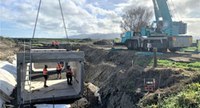Our intentions: Looking at how councils are planning for flood protection
Flooding is New Zealand’s most frequent natural hazard. The effects of climate change mean that floods are occurring more often and they are more severe.
Regional councils and a small number of city and district councils are responsible for protecting their communities from flooding, erosion, and other hazards posed by rivers, streams, and their catchments. To do this, councils plan and fund infrastructure (such as stop banks) and use other measures under their control (such as land use planning).
Councils face several challenges in effectively protecting communities against flooding. These include aging infrastructure, affordability, and complex rules and regulations.
What we are focusing on
Our work will look at how Waikato Regional Council and Tasman District Council agree on the levels of flood protection each will provide, and how well they are planning to achieve those levels using flood protection infrastructure.
To do this, we will look at the information the councils have used to help them understand flood risks and how well they engage with iwi/Māori, affected communities, and other stakeholders on the level of protection to be provided.
We will also look at:
- what the councils know about the current performance of their flood protection infrastructure;
- how they prioritise where to put their infrastructure investment; and
- the information they use in planning to achieve the aimed-for level of protection.
The difference we expect to make
Our work will provide Parliament, the public, and the two councils with an independent view on how well the councils understand flood risks, and how well they are planning to reduce those risks.
We expect our work to be useful for other councils planning and implementing flood protection measures in their areas.
Our work will result in a report to Parliament, which we will publish on our website. We expect to complete this work in mid-2025.
Please use the feedback form on the right if you’d like to speak to a staff member about this work, make a suggestion, or ask a question.

